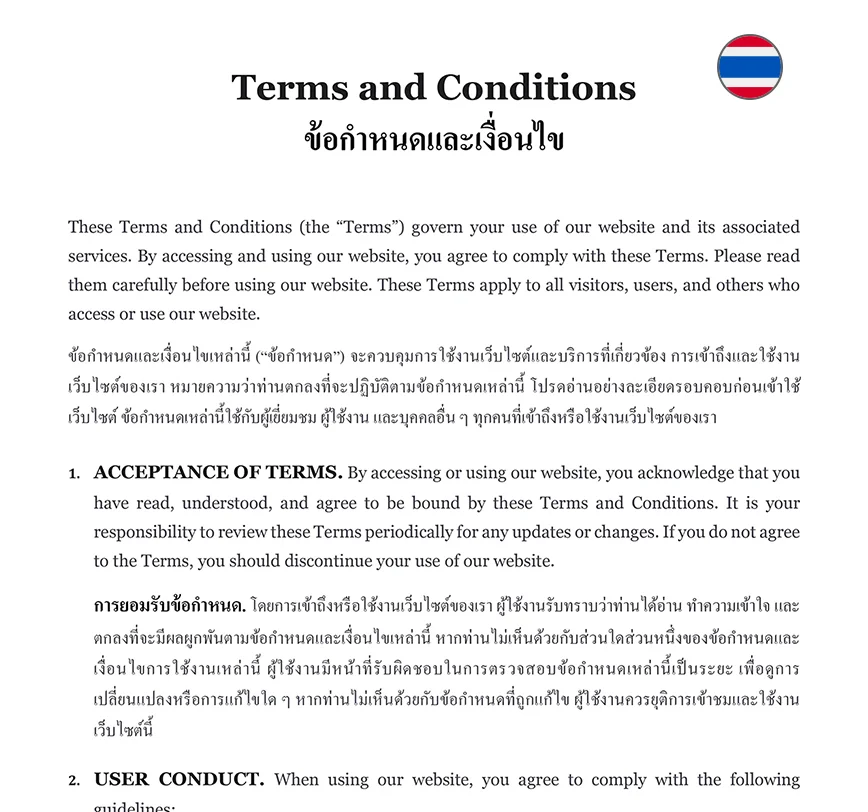Ready to use legal template
Drafted by experienced lawyers
Certified Thai-English translation
Ready to use legal template
Drafted by lawyers
Translated in Thai-English
Home › Intellectual property › Terms and Conditions
Learn more about Terms and Conditions
Navigating the digital landscape in Thailand requires a robust legal foundation, and that’s where Website Terms and Conditions play a pivotal role. These terms outline the rules, rights, and responsibilities governing the use of your website, promoting transparency and safeguarding both you and your users. Seamlessly align your digital presence with legal requirements by utilizing Themis Partner’s crafted legal template. Our expertly designed template, drafted by experienced lawyers, ensures your Website Terms and Conditions comply with Thailand’s legal framework. With an easy-to-edit format, you can customize the terms to suit your website’s unique needs while ensuring legal compliance.
📄 Related documents
Table of contents
-
What are website Terms and Conditions?
-
Why do I need Terms and Conditions for my website/app?
-
What should Terms and Conditions include?
-
Are website Terms and Conditions enforceable?
-
How do Terms and Conditions protect my website/app?
-
What legal considerations apply to T&C in Thailand?
-
What happens if users violate Terms and Conditions?
-
How Do website Terms and Conditions handle user Data and Privacy?
What are website Terms and Conditions?
Website Terms and Conditions, often referred to as “Terms of Use” or “Terms of Service,” are legal agreements that outline the rules, terms, and obligations that govern the relationship between a website owner and its users. These agreements establish the terms under which visitors can access and use the website, including the rights and responsibilities of both parties. Website Terms and Conditions cover a wide range of aspects, such as user behavior, content usage, intellectual property rights, disclaimers, privacy policies, and dispute resolution mechanisms. Crafting clear and comprehensive Terms and Conditions is essential to ensure legal compliance, protect the website owner’s interests, set user expectations, and provide a transparent framework for online interactions.
Why do I need Terms and Conditions for my website/app?
Integrating comprehensive Terms and Conditions into your website or app is vital for multiple reasons. These legal agreements establish essential guidelines and rules that govern the relationship between you, the website/app owner, and your users. By outlining user behavior expectations, content usage, and other crucial aspects, Terms and Conditions help mitigate misunderstandings and disputes.
Moreover, they offer legal protection by setting clear boundaries, limiting your liability, and addressing intellectual property rights. These terms also ensure compliance with privacy regulations, establish dispute resolution methods, and enhance user accountability. Demonstrating professionalism and building trust, Terms and Conditions are often required by platforms and contribute to a secure, transparent, and successful online presence.
What should Terms and Conditions include?
1. Acceptance of Terms
Clearly state that users agree to abide by the Terms and Conditions by accessing or using the website/app.
2. User Obligations
Outline user responsibilities, such as providing accurate information, refraining from unlawful activities, and adhering to community guidelines.
3. Intellectual Property
Specify ownership rights of content, trademarks, and copyrights, and explain how users can use or share such materials.
4. Content Usage
Define rules for using, posting, and sharing content on the platform, including restrictions on offensive, infringing, or harmful content.
5. Privacy and Data Handling
Detail how user data is collected, stored, and used, along with mechanisms to protect user privacy and comply with data protection laws.
6. Cookies and Tracking
Inform users about the use of cookies, tracking technologies, and their purpose.
7. Disclaimers
Include disclaimers that limit your liability for inaccuracies, errors, or misuse of information on the website/app.
8. Limitation of Liability
Clarify the extent of your liability for damages and losses resulting from the use of the website/app.
9. User Conduct
Specify prohibited activities, such as hacking, spamming, impersonation, or engaging in fraudulent behavior.
10. Termination
Outline circumstances under which you can terminate a user’s access to the platform, and the potential consequences.
11. Governing Law
Specify the jurisdiction whose laws will govern any disputes arising from the agreement.
12. Dispute Resolution
Include mechanisms for resolving disputes, such as arbitration or mediation.
Are website Terms and Conditions enforceable?
Yes, website Terms and Conditions are indeed enforceable. These legal agreements serve as binding contracts between website owners and users, outlining the terms of use, user obligations, and other essential provisions. When users access or use a website, they are typically required to accept and agree to these terms. While the enforceability of Terms and Conditions can vary based on factors such as jurisdiction and the clarity of language used, courts generally recognize well-drafted and prominently displayed terms as legally binding.
To enhance enforceability, it’s crucial to ensure that your Terms and Conditions are written in clear and understandable language in English and Thai, easily accessible on your website, and regularly updated to reflect any changes. This way, you can establish a solid legal foundation that protects both your interests and those of your users.
How do Terms and Conditions protect my website/app?
Terms and Conditions play a pivotal role in safeguarding your website or app in various ways. These legal agreements establish clear guidelines, user obligations, and the rules of engagement, offering multiple layers of protection. They limit your liability by including disclaimers and outlining user responsibilities, helping prevent potential legal disputes. Moreover, Terms and Conditions address intellectual property rights, granting you control over your content and minimizing the risk of unauthorized use.
By specifying data handling practices, you ensure compliance with privacy regulations, enhancing user trust. Additionally, these terms set the stage for effective dispute resolution, while termination clauses offer the means to manage user behavior and mitigate risks. Ultimately, robust Terms and Conditions fortify your online presence, reduce legal vulnerabilities, and provide a secure environment for both you and your users.
What legal considerations apply to T&C in Thailand?
When formulating Terms and Conditions (T&C) for your website or app in Thailand, it’s imperative to address critical legal considerations to adhere to local regulations. Aligning with the Consumer Protection Act, ensure your T&C provide transparent information about goods, services, and prices. Comply with the Personal Data Protection Act (PDPA) by detailing data collection, processing, and user consent. Clarify ownership of intellectual property in line with Thai law and adhere to the Electronic Transactions Act regarding electronic signatures. Abide by PDPA rules when discussing cookies and tracking. Incorporate user rights concerning refunds, returns, and cancellations as mandated by the Consumer Protection Act.
Specify dispute resolution methods and employ clear language in Thai for understanding. Account for minors’ access with clauses on age verification and parental consent, and establish the jurisdiction of Thai courts.
Cover termination, unlawful activities, liability limitations, and notify users of T&C changes. To ensure comprehensive compliance, consult legal experts familiar with Thai law during the T&C drafting process.
What happens if users violate website Terms and Conditions?
In the event that users violate the website’s Terms and Conditions, certain consequences and actions are typically outlined to address such breaches. Depending on the severity of the violation, consequences can range from warnings and temporary suspensions to permanent account terminations. By clearly defining prohibited activities in the Terms and Conditions, website owners establish a basis for taking appropriate measures. These actions aim to maintain a safe and respectful online environment, protect the website’s integrity, and uphold the rights of both users and the platform. It’s essential to ensure that the consequences for violating the Terms and Conditions are transparently communicated to users, align with local laws, and are consistently applied to ensure fairness and accountability across the user base.
How do website Terms and Conditions handle user data and privacy?
Website Terms and Conditions play a crucial role in managing user data and privacy concerns. They outline how user data is collected, stored, processed, and protected while using the website. By incorporating specific clauses related to data handling, website owners ensure transparency and compliance with data protection laws. These clauses typically inform users about the types of data collected, the purpose of collection, and the mechanisms in place to secure sensitive information.
Terms and Conditions address user consent for data usage, details on sharing data with third parties, and options for users to access, modify, or delete their data. By providing clear guidelines on data management, website owners instill trust, demonstrate commitment to user privacy, and establish a framework that aligns with relevant legal requirements.
SPECIAL OFFER
eCommerce
5 Document Package
Essential website/app policies for online business in Thailand
Website Terms and ConditionsTemplate (.docx)
Easy and quick to customize
310 client reviews (4.8/5) ⭐⭐⭐⭐⭐
Share information
Why Themis Partner?
Easy legal documents at your fingertips
Make trusted documents for hundreds of purposes.
Hundreds of documents
Instant access to our entire library of documents for Thailand.
24/7 legal support
Quick legal advice from our network of qualified lawyers.
Easily customized
Editable Word documents, unlimited revisions and copies.
No translation fees
Certified Thai-English translation included for all documents.
Legal and Reliable
Documents written by lawyers that you can use with confidence.
Free consultation
Free lawyer consultation on each new matter.




